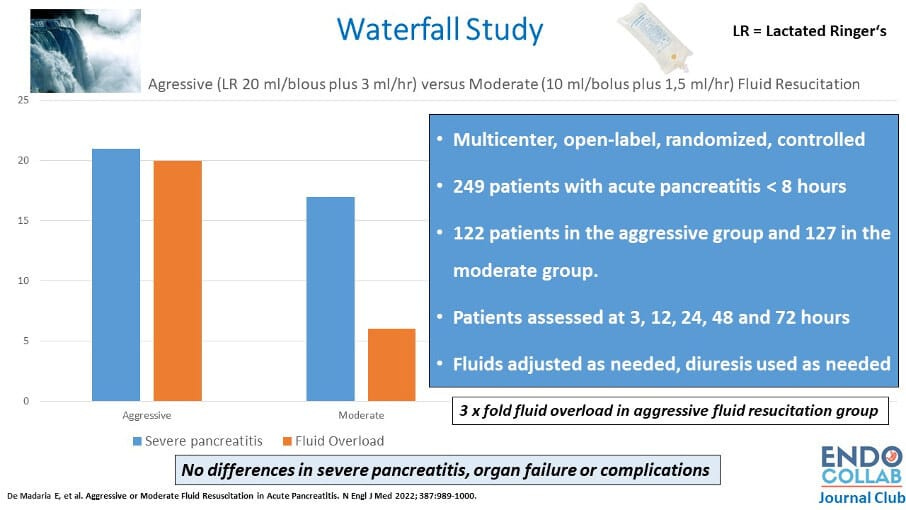Aggressive Fluid resuscitation in Acute Pancreatitis: Too Much of a Good Thing
A ground-breaking, solid, practice-changing, and "dogma-removing" study
Welcome to 5,921 motivated Endoscopists! Today we will go over a ground-breaking, solid, practice-changing, and “dogma-removing” study.

Current guidelines recommend aggressive early fluid resuscitation in the treatment of acute pancreatitis. However, controversy remained regarding the rate and volume of fluid resuscitation.
In this well-designed, prospective, randomized trial De Madaria and colleagues from 18 centers around the World provide an answer to this question.
A total of 249 patients with acute pancreatitis of less than 8 hours’ duration were randomized to aggressive versus moderate fluid resuscitation and assessed at 3, 12, 24, 48 and 72 hours. There were no differences in important clinical outcomes such as severe pancreatitis, organ failure or complications. Importantly, in patients treated with aggressive fluid resuscitation there were 3 x fold increase in volume overload.
The importance of this study not only stems from the fact showing that too much fluid results in volume overload, but also showing that a dynamic assessment of patient’s status, followed by adjustment of fluid volume is always mandatory. Indeed, the moderate resuscitation group received a median of 5.5 liters, compared to 7.8 liters in the aggressive fluid resuscitation group. Furthermore, in this study patients were also carefully assessed for euvolemia during the first 72 hours, receiving diuretics if volume overload was detected, regardless of volume resuscitation strategy. Importantly, this study also shows that diuresis in patients with fluid overload during the first 72 hours was not detrimental to clinical outcomes.
In essence, fluid resuscitation for the treatment of acute pancreatitis is still important, but it should be based on patient’s needs, and not on blind, aggressive pouring of fluids into the body. Most importantly, fluids administration should be based on needs and monitored and handled constantly to keep the patient euvolemic.
Reference:
De Madaria E, et al. Aggressive or Moderate Fluid Resuscitation in Acute Pancreatitis. N Engl J Med 2022; 387:989-1000.


I'm confused by studies which conflate all etiologies of pancreatitis.
Assume that in certain populations, ≈ 90% of pancreatitis is due to EtOH and gallstones.
The mechanism of injury is completely different.
Why would we assume a specific intervention would have the same outcome?